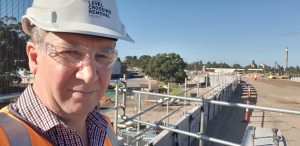Refugees helping to build Victoria
More than 50 refugees and asylum seekers have been placed into jobs and cadetships supporting Victoria’s big build.
Migrant and refugee settlement agency AMES Australia, in partnership with government agencies, contractors and consortiums working on Victoria’s major infrastructure projects, has placed skilled and professional migrants and refugees with projects including the Metro Tunnel, the Rail Crossing Removal Project and the Westgate Tunnel.
This success, along with promising developments in other industries, has prompted increased commitment; with the recent launch of AMES’ new Social Traders certified social enterprise Settling Into Work, there is even more support available to help refugees and migrants into sustainable, fulfilling careers.
Over the past four years, AMES Australia has been partnering with companies and agencies including the Level Crossing Removal Project, Major Roads Projects Victoria, Metro Trains and tier one construction contractors to provide pathways to sustainable employment for professionally qualified refugees and asylum seekers.
AMES is a partner in the Engineering Pathway Industry Cadetship (EPIC) program which sees refugee and asylum seeker participants receive on-the-job training, support and mentoring and also complete a postgraduate Graduate Certificate in Infrastructure Engineering Management through Swinburne University.
The 18-month industry-first program aims to bridge the gap faced by new Australians in matching their international qualifications to Australian workforce requirements.
The Graduate Certificate, combined with their international qualifications and the workplace experience gained through the program, will kick-start the cadet’s careers in engineering in Victoria.
The paid cadetship provides 18-months of valuable local work experience, on the job training and access to industry networks – addressing the barriers often faced by new Australians in accessing professional employment.
 Iraqi civil engineer Waseem Jahola is employed on Melbourne’s Level Crossing Removal Project.
Iraqi civil engineer Waseem Jahola is employed on Melbourne’s Level Crossing Removal Project.
He and his family were forced to flee their home in Mosul in 2014 when ISIS occupied the city. They fled to Erbil, in northern Iraq and them to Jordan before arriving in Australia in 2016.
Waseem was part of the EPIC program which saw him complete a graduate diploma in infrastructure engineering management at Swinburne University as well as a three month internship.
He is now working full time in the design and development team planning the removal of level crossings.
“I’m really enjoying my job and AMES and EPIC program were really helpful in me getting to this point,” Waseem said.
Another EPIC candidate Mohammed Hassan, an engineer from Yemen, said the program had been critical to re-establishing his career in Australia.
“The EPIC program has been very good for me. It has given me the opportunity to gain local experience and it has introduced me to the engineering fraternity here in Australia,” Mohammed said.
Afghan electrical engineer Mustafa Ayobi recently landed a job with Metro Trains.
Mustafa joined AMES Australia’s refugee support and mentoring programs where he was guided though the steps he needed to take, gaining knowledge of the engineering sector, resume writing and interview techniques.
“This was really helpful to me in understanding what it takes to land a job,” he said.
“My dream was always to be an engineer and now I’m living it. Sometimes even I can’t believe this has happened after all the difficulties I’ve faced,” Mustafa said.
“I came from a war torn country and lots of stuff was always being destroyed. I wanted to become an engineer to help make things better and be part of the country’s future development, especially in technological aspects,” Mustafa said.












